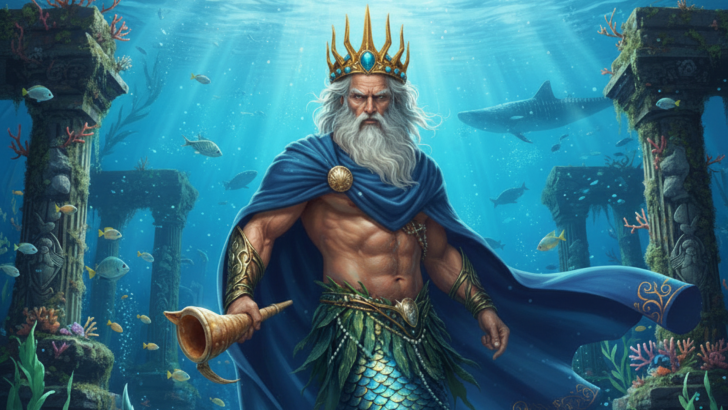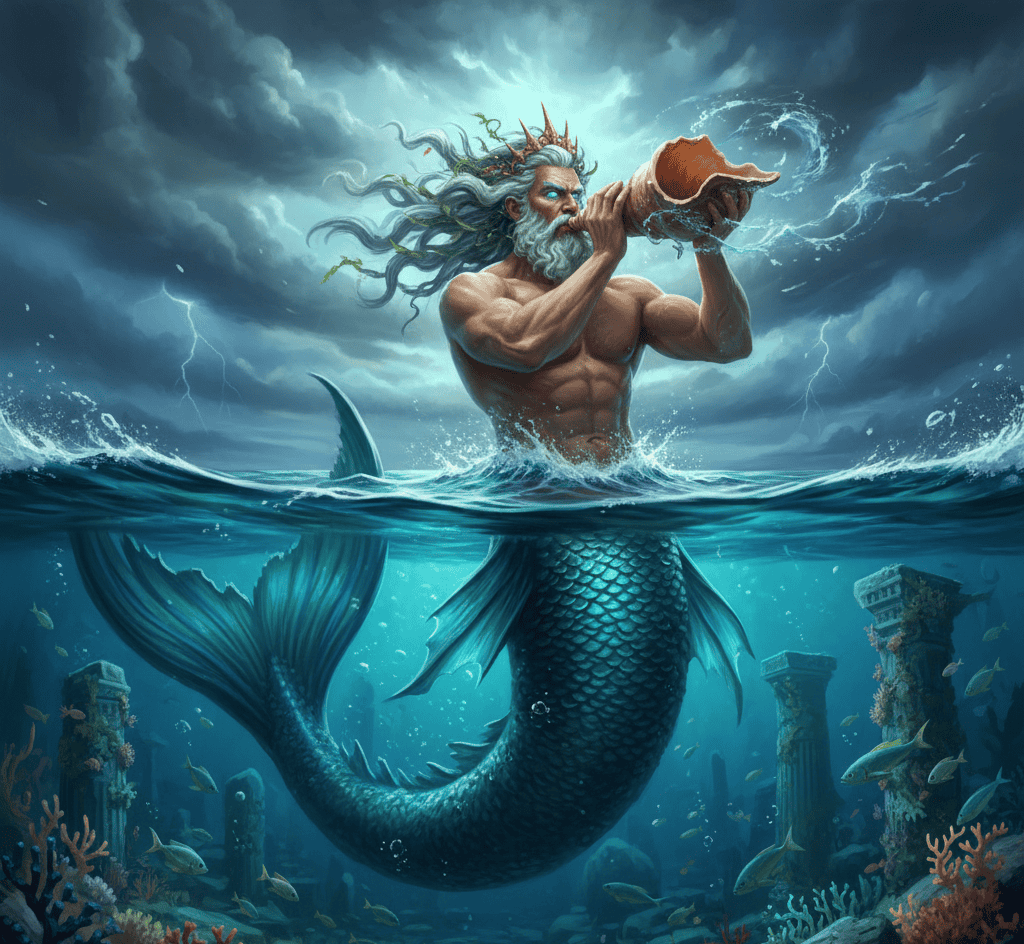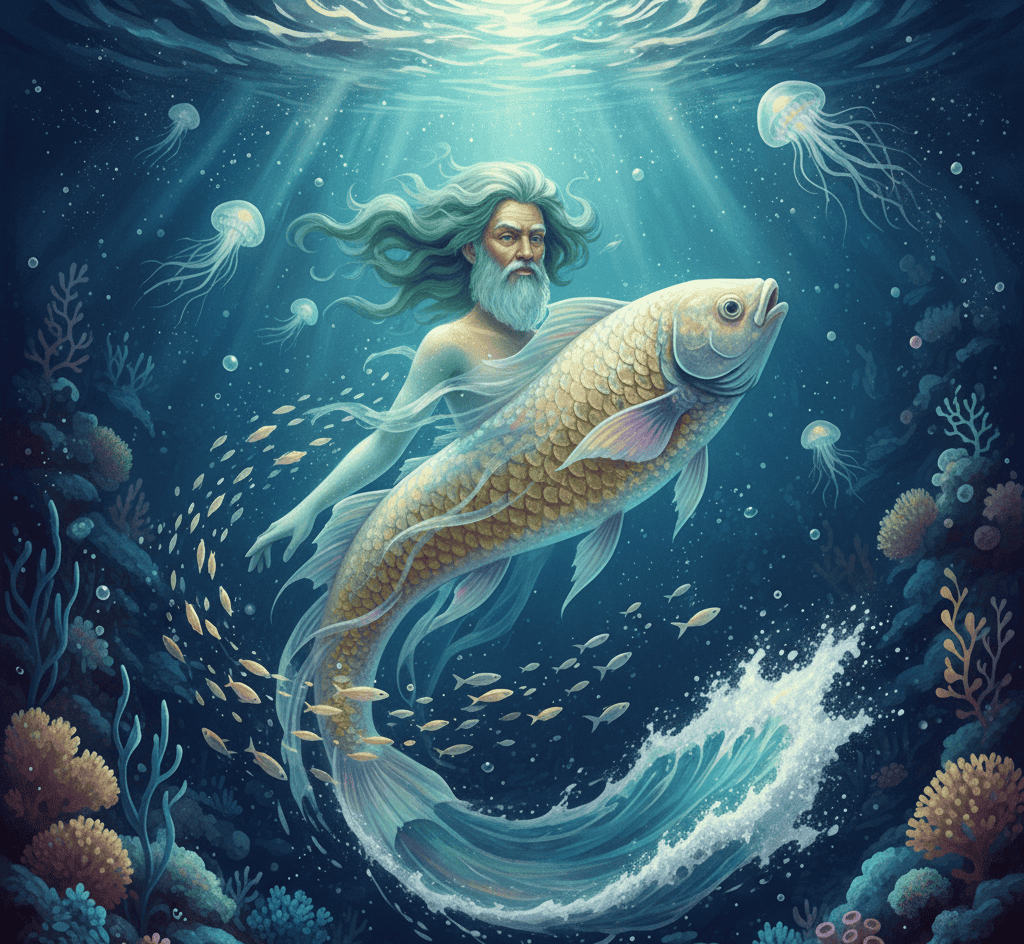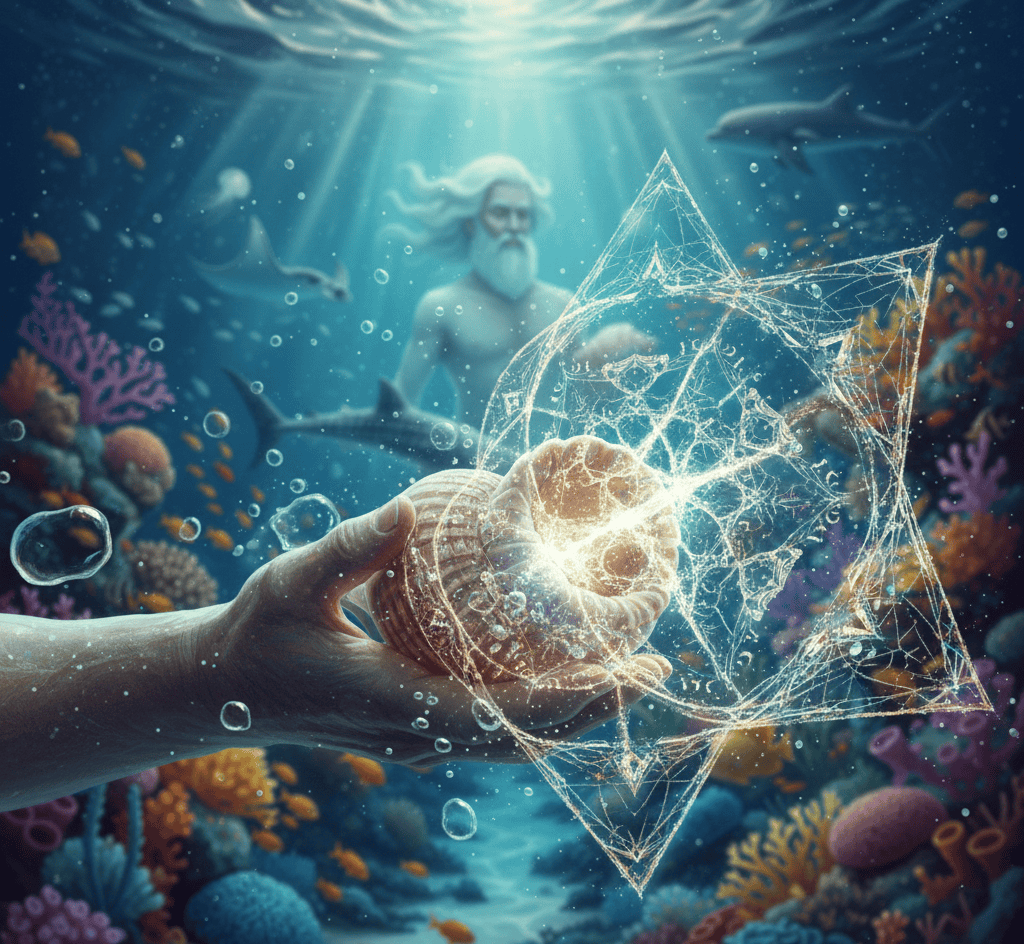When you think of sea gods, you probably picture mighty Poseidon shaking the oceans with a strike of his trident.
But hidden beneath the waves lived another god, one far more mysterious, more musical, and sometimes more terrifying.
This was Triton, son of Poseidon and Amphitrite, a sea god who used not a weapon, but his voice.
Legends say Triton could sing storms into existence. His call echoed through the deep like a conch shell awakening the sea itself.
While heroes feared monsters and sailors feared shipwrecks, everyone feared Triton’s song. And yet he was not only a bringer of chaos.
He was also a messenger, protector, and guide through the shifting waters of the world.
Today, we dive into the life of Triton, the god with the voice that could calm or shatter the sea, and why his legend still ripples through the ocean myths of Greece.
The Sea Prince Born From Tides and Thunder
Triton was the firstborn son of Poseidon and Amphitrite, making him royalty in the kingdom beneath the waves.
He grew up in the glittering palace of the sea, a home made of coral, pearls, and living currents.
While Poseidon ruled the surface storms and decided the fate of sailors, Amphitrite controlled the life and rhythm of the underwater world.
Triton inherited something from both of them. He was often described with the upper body of a young man and the shimmering tail of a fish.
His skin carried the pale glow of sand under sunlight, and his hair flowed like seaweed caught in a current.
Some stories even say he had scales along his arms that sparkled green and gold when light touched them.
But his most important feature was the object he carried everywhere. A conch shell.
Triton’s conch was more than a simple instrument. It was an extension of his voice and his power.
When he blew into it, waves rolled in new patterns. Winds answered. Clouds gathered. The world shifted.
No other god had a voice that could reach so far or command such respect.
Mortals often confused this power for rage. But for Triton, sound was simply how he spoke to the world.
A Voice That Could Calm or Create Chaos
The stories of Triton’s voice vary, but they all agree on one thing. He had the power to command the sea with sound.
When he sang softly, the water settled, and storms broke apart like mist. Sailors who heard his gentle call believed they were blessed.
Some claimed they saw dolphins appear, guiding their ships safely to shore. Others said the water turned clear enough to glimpse the ocean floor.
His peaceful songs soothed sea spirits, quieted currents, and brought harmony to the underwater kingdom.
But when Triton raised his voice, everything changed. His loud call was described as deep, echoing, and strong enough to crack the sky.
He could summon storms with a single breath into his conch. Winds would howl. Waves would rise like mountains.
Ships that once glided calmly suddenly fought for survival. Some sailors prayed they would never hear his cry again, because if Triton was singing loudly, something powerful was stirring.
Unlike Poseidon, Triton did not cause storms out of anger. Instead, he responded to the imbalance.
If humans polluted the waters, hunted sacred sea creatures, or ignored ancient rules, Triton’s call became a warning.
A storm summoned by his voice was a reminder that the sea was alive and demanded respect. He was not the god of chaos. He was the god of consequences.
The Forgotten Helper of Heroes
While Triton was feared by sailors, he also helped several heroes in surprising ways.
Unlike Poseidon, who often had complicated relationships with mortals, Triton was more willing to guide those who treated the ocean with reverence.
One of the most famous examples is the story of the Argonauts, the band of heroes who sailed in search of the Golden Fleece.
When they found themselves caught in the shifting channels of Libya, unable to navigate the brutal landscape of sand and sea, they prayed for help.
Triton answered. He rose from the water in a dazzling form and guided them by giving them a magical clod of earth.
When they threw it into the sea, a safe passage opened for them. He saved them not with storms, but with direction.
In another tale, he confronted the giant Polybotes during the Gigantomachy, the battle between gods and giants.
Triton blew his conch with such force that the giant froze in terror, allowing Poseidon to defeat him easily.
His voice worked not only on the sea, but on the hearts of those who challenged the gods. Triton’s role was always flexible.
He became a messenger, a warrior, a guardian, or a guide depending on what the moment demanded.
Most sea gods were tied to a single domain. Triton flowed between them like water.
A Shape-Shifting Mystery of the Deep
One of the lesser-known but fascinating powers attributed to Triton was shape-shifting.
Several myths mention that sea gods, especially those related to his grandfather Nereus, could change form.
Triton inherited this gift. He could appear as a glimmering fish, a wave, a human youth, or a towering sea spirit with scales that flashed like lightning.
The most famous example appears in the story of Scylla. Some versions claim Triton fell in love with her and tried to win her over.
Others say he tried to protect her from the curse that later transformed her into a sea monster.
Shape-shifting gods often carried complicated emotions because changing form made it harder to remain steady.
Triton’s shifting identity reflected the ever-changing sea. Calm one moment. Furious the next. Clear at dawn. Stormy by dusk.
But unlike other shapeshifting gods, Triton used his powers sparingly.
He preferred to remain himself, a sign that he was confident in his role and did not hide behind illusions unless he needed to.
Why Triton Still Matters in Ocean Mythology
Today, Triton’s name survives in many places. Neptune’s largest moon is named after him.
Statues of him appear in modern fountains. He has become a symbol of the sea’s strength and beauty. Yet the deeper meaning of his myth is often forgotten.
He reminded ancient people that the sea was not only a place of danger but also a place of guidance.
And that nature responds to how we treat it. When the ocean is respected, it is generous. When it is ignored or harmed, it answers with storms.
Triton was the prince who shaped storms, the messenger who guided lost sailors, the warrior whose conch frightened giants, and the quiet god who balanced the moods of the deep.
He did not seek worship or fame. He did not chase battles or glory. He existed to keep the world in harmony with the sea. And his legend still echoes through the waves.

自出生以来,我一直感觉到自己与神灵有着紧密的联系。作为一名作家和导师,我的使命是帮助他人在最黑暗的时刻找到爱、幸福和内心的力量。






